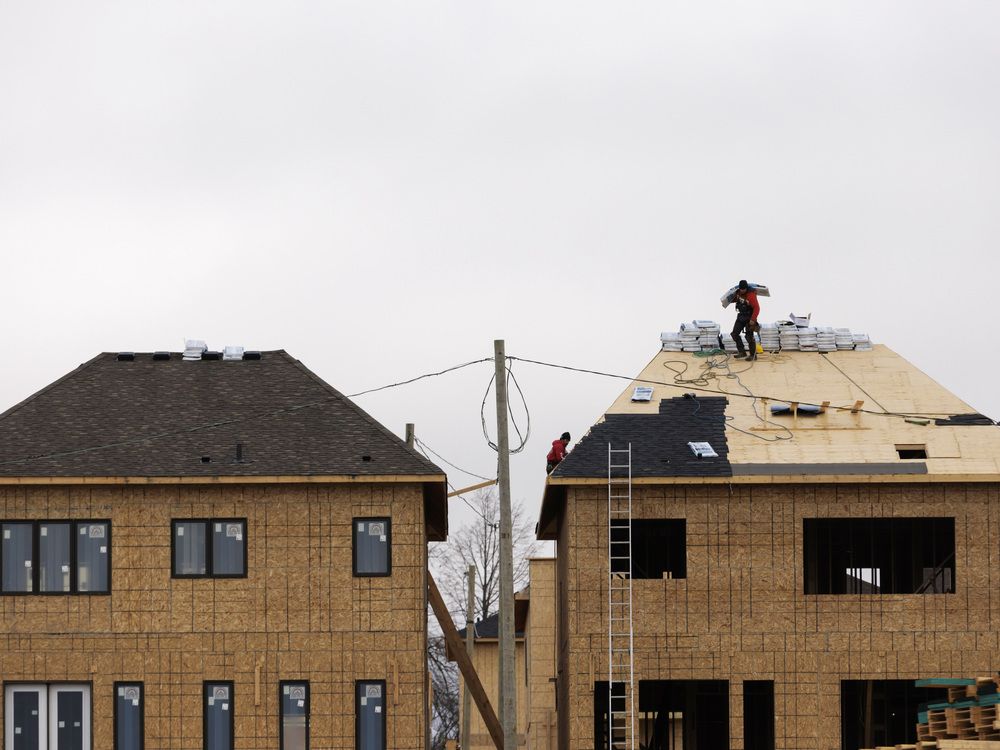Top Stories
Canada Housing Supply Gap Widening as CMHC Adjusts Targets

URGENT UPDATE: The Canada Mortgage and Housing Corporation (CMHC) has just announced a significant shift in its housing affordability targets, revealing that Canada’s housing supply gap is widening, not narrowing. In a stark departure from its original goal of restoring affordability by 2030, the CMHC now projects a more modest aim of 430,000 to 480,000 housing starts annually over the next decade.
In its latest update, released earlier today, CMHC acknowledged that the country fell short in 2022, with only 245,000 housing units built—less than half of the necessary annual rate of 500,000 needed to regain early-2000s affordability. Now, the agency is shifting focus from completions to housing starts, reflecting ongoing bottlenecks that threaten to deepen the crisis.
The implications are profound: CMHC’s new target aims to restore affordability only to 2019 levels, which is already proving unrealistic. The Canadian Renters Report indicates that 40% of renters are delaying homeownership, expecting further price declines. This sentiment, coupled with rising materials and labor costs, exacerbates the housing crisis.
“Unless delays are reduced, efforts to double housing starts will struggle to gain traction,” warns the Canadian Home Builders’ Association. Currently, obtaining a building permit in Canada takes an average of 250 days, nearly three times longer than in the United States. In major cities like Toronto and Hamilton, this delay can stretch to 25 and 31 months, respectively.
The CMHC’s projections highlight the urgent need for action. With rising unemployment, geopolitical instability, and ongoing economic pressures, the housing market is increasingly unstable. If current trends persist, homebuyers could face a staggering 33% increase in ownership costs by 2035.
The federal government has recognized the challenges, aiming to reduce costs and speed up approvals. However, progress has been slow, with municipalities relying on development charges to fund infrastructure. As the private market reacts to diminished demand, builders are pausing or canceling projects altogether.
In contrast, public and non-market housing options remain limited, with 245,900 households on the waitlist for social and affordable housing as of 2024. While innovative solutions such as prefabrication could expedite construction, the lack of consistent demand in the current market hampers these efforts.
With the stakes higher than ever, Canada risks losing credibility in addressing one of its most pressing policy challenges. As CMHC continues to adjust its housing targets, the urgency for effective action is palpable. The ongoing housing affordability crisis demands immediate attention and a reassessment of strategies to meet the needs of Canadians.
Watch for further updates as the situation develops.
-

 World3 months ago
World3 months agoScientists Unearth Ancient Antarctic Ice to Unlock Climate Secrets
-

 Entertainment3 months ago
Entertainment3 months agoTrump and McCormick to Announce $70 Billion Energy Investments
-

 Science3 months ago
Science3 months agoFour Astronauts Return to Earth After International Space Station Mission
-

 Lifestyle3 months ago
Lifestyle3 months agoTransLink Launches Food Truck Program to Boost Revenue in Vancouver
-

 Technology2 months ago
Technology2 months agoApple Notes Enhances Functionality with Markdown Support in macOS 26
-

 Top Stories1 week ago
Top Stories1 week agoUrgent Update: Fatal Crash on Highway 99 Claims Life of Pitt Meadows Man
-

 Sports3 months ago
Sports3 months agoSearch Underway for Missing Hunter Amid Hokkaido Bear Emergency
-

 Politics2 months ago
Politics2 months agoUkrainian Tennis Star Elina Svitolina Faces Death Threats Online
-

 Technology3 months ago
Technology3 months agoFrosthaven Launches Early Access on July 31, 2025
-

 Politics3 months ago
Politics3 months agoCarney Engages First Nations Leaders at Development Law Summit
-

 Entertainment3 months ago
Entertainment3 months agoCalgary Theatre Troupe Revives Magic at Winnipeg Fringe Festival
-

 Politics1 week ago
Politics1 week agoShutdown Reflects Democratic Struggles Amid Economic Concerns




















